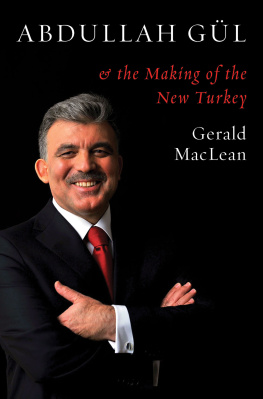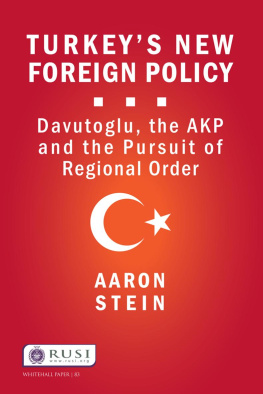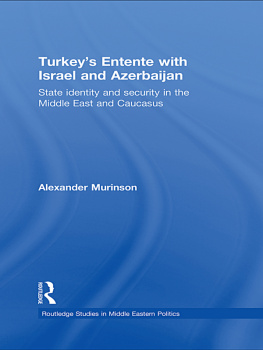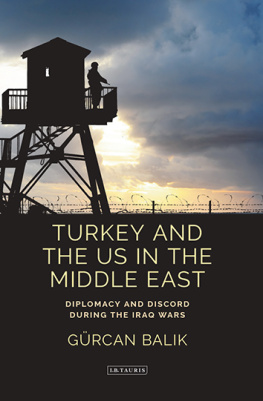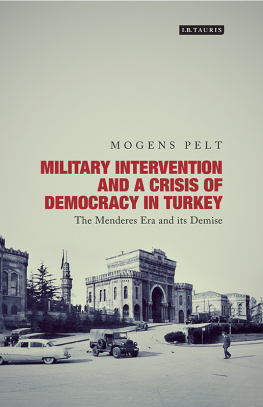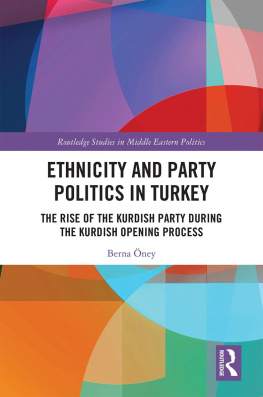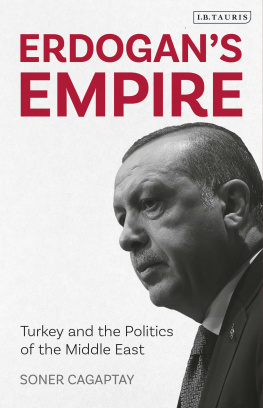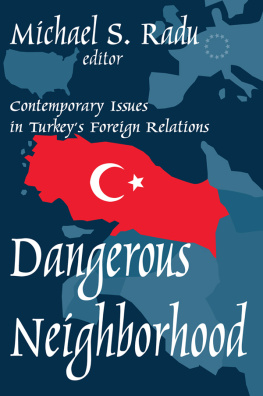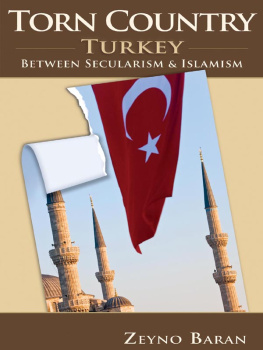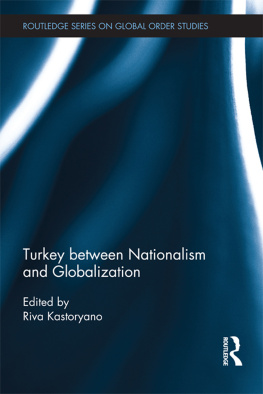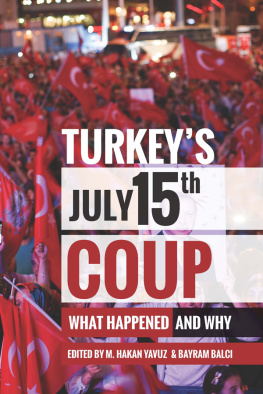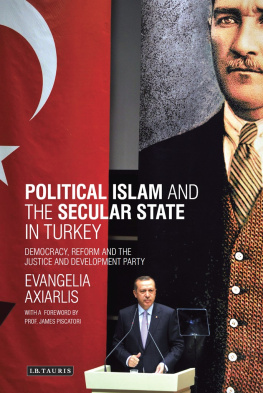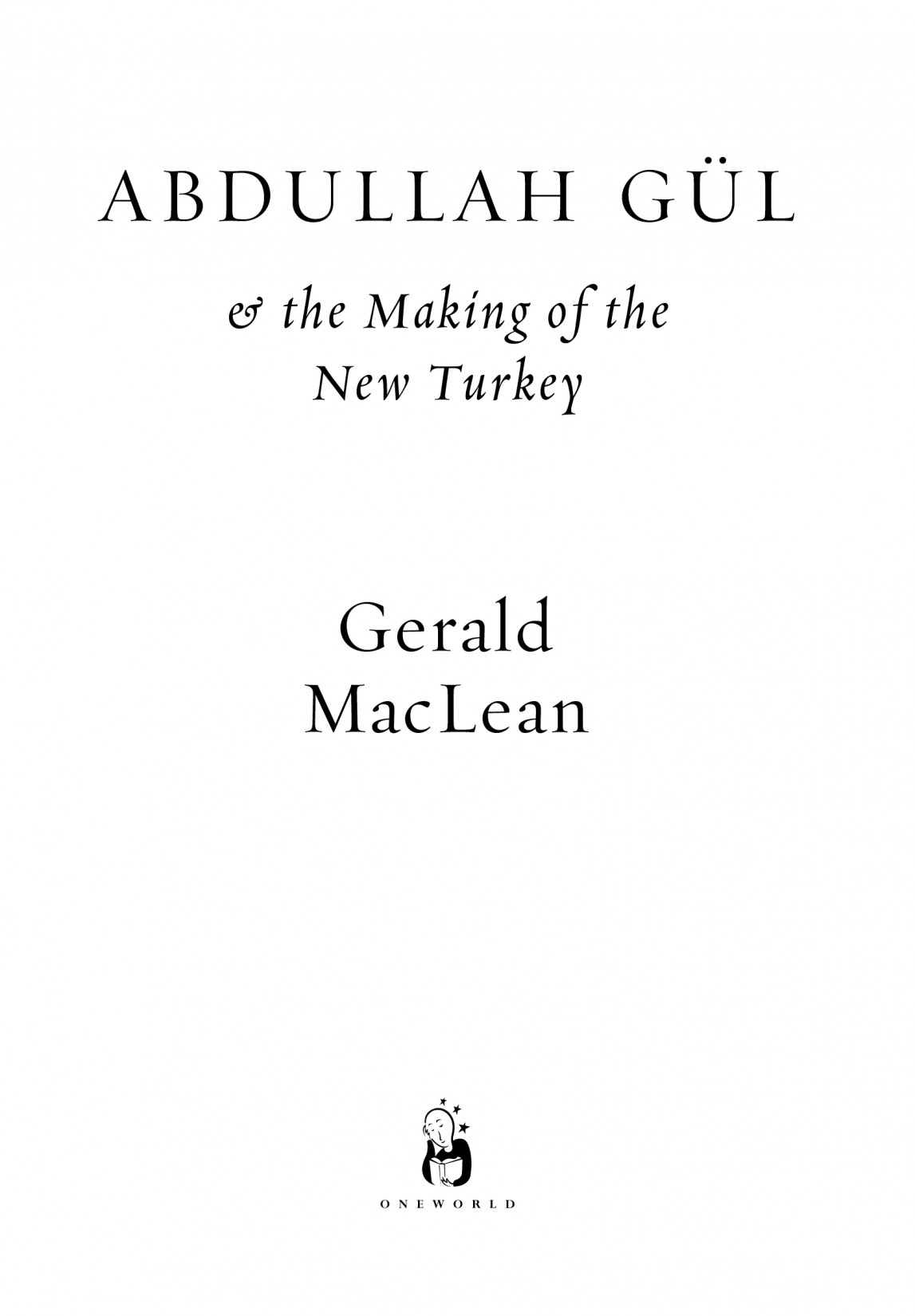A Note on Pronunciation
In the modern Turkish alphabet, introduced in 1928, words are pronounced phonetically and most letters are pronounced as in English with the following exceptions:
a is always short, as in cat
c j as jazz
ch as in charity
sh as in shell
without a dot as the final vowel in Cyril
i with a dot as in bit; for English readers I have avoided the ungainly looking but strictly correct dotted capital
as in German
as in German
unvoiced, silently lengthens the preceding vowel
Abbreviations
AKP Adalet ve Kalknma Partisi or Justice and Development Party
ANAP Anavatan Partisi or Motherland Party
AP Adalet Partisi or Justice Party
BDP Bar ve Demokrasi Partisi or Peace and Democracy Party
CHP Cumhuriyet Halk Partisi or Republican Peoples Party
CUP Committee of Union and Progress
DEP Demokrasi Partisi or Democracy Party
DGM Devlet Gvenlik Mahkemeleri or State Security Courts
DP Demokrat Parti or Democrat Party
DSP Demokratik Sol Parti or Democratic Left Party
DTP Demokratik Toplum Partisi or Democratic Society Party
DYP Doru Yol Partisi or True Path Party
EU European Union
FOSIS Federation of Student Islamic Societies
FP Fazilet Partisi or Virtue Party
HEP Halkn Emek Partisi or Peoples Labour Party
IHH Insan Hak ve Hrriyetleri ve Insani Yardm Vakf or Foundation for Human Rights and Freedoms and Humanitarian Relief
IMF International Monetary Fund
JITEM Jandarma Istihbarat ve Terrle Mcadele Grup Komutanl or Gendarmerie Intelligence and Counter-Terrorism Centre
KAYSO Kayseri Sanayi Odas or Kayseri Chamber of Industry
KCK Koma Civaken Kurdistan or Union of Communities of Kurdistan
MP Miliyet alma Partisi or Nationalist Working Party
MHP Milliyeti Hareket Partisi or Nationalist Action Party
MIT Milli Istihbarat Tekilat or National Intelligence Organization
MNP Milli Nizam Partisi or National Order Party
MSP Milli Selmet Partisi or National Salvation Party
MTTB Milli Trk Talebe Birlii or National Turkish Student Association
MSIAD Mstakil Sanayici ve I Adamlar Dernei or Independent Industrialists and Businessmens Association
NATO North Atlantic Treaty Organization
NGO Non-governmental organization
OECD Organization of Economic Co-operation and Development
OIC Organization of the Islamic Conference
OYAK Ordu Yardmlama Kurumu or Army Mutual Assistance Association
PACE Parliamentary Assembly of the Council of Europe
PKK Parti Karkerani Kurdistan or Kurdistan Workers Party
SHP Sosyaldemokrat Halk Parti or Social Democratic Populist Party
SODEP Sosyal Demokrasi Partisi or Social Democracy Party
SP Saadet Partisi or Felicity Party
TIP Trkiye Ii Partisi or Turkish Workers Party
TRT Trkiye Radyo Televizyon
List of Illustrations
Unless otherwise indicated, all illustrations are courtesy of the Office of the Presidency of the Republic of Turkey and Madame Hayrnnisa Gl.
Abdullah Gl aged
Abdullah Gl aged
Abdullah Gl graduates from Gazi Paa Primary School, 1962.
Ahmet Hamdi Bey at work.
Kayseri Lyce, late 1960s. Abdullah Gl is standing, second on the right.
Abdullah Gl addresses a MTTB student rally at anakkale, 1972.
Necip Fazl Ksakrek with members of the Istanbul MTTB group, 1974. From the left: Mehmet Tekeliolu, [?], Yaar Karayel, Necip Fazl, Abdullah Gl, [?], Professor Saffet Solak.
London, 1976. Ali Ihsan, Fehmi Koru (in front), Abdullah Gl, Mehmet Tekeliolu.
Hyde Park, London, 1977. Fehmi Koru, Abdullah Gl, kr Karatepe.
Abdullah Gl during his military service, Tuzla Barracks, 1981.
A family day out on the Jeddah Corniche; mid-1980s.
At home with Kbra and Ahmet Mnir in Jeddah, 1989.
Abdullah Gl with Dr Asaf Ahmet, Islamic Development Bank, Jeddah, 1989.
A family visit to the Dolmabahe Palace, Istanbul; early 1990s.
Abdullah Gl addresses the Parliamentary Assembly of the Council of Europe, Strasbourg, 1993.
Abdullah Gl with Necmettin Erbakan and evket Kazan, Ankara, 1995.
).
).
President and Madame Gl welcome Queen Elizabeth and Prince Philip to Turkey, Istanbul, 14 May 2008.
President Gl and Queen Elizabeth II at Westminster, November 2010.
President Abdullah Gl visits Kayseri; Mount Erciyes in the background, 26 June 2011.
President and Madame Gl with Prime Minister and Madame Erdoan, Istanbul, 29 May 2013.
Foreword
This book is an attempt to explore what has been happening in Turkey since the end of the Second World War by focusing on the life and career of Abdullah Gl, the eleventh president. Although it is not an official biography, it could not have been written if President Gl had not been willing to talk to me, and for his time and the support of his staff I am grateful. But before I say anything more about the curious circumstances that led me to undertake this work, it will be useful to indicate in the most general way something of what was going on in Turkey in the period leading up to the story of Abdullah Gls life and career. Since it is written in English, this book also needs to offer some preliminary account of itself, not least because there are two well-known English-language biographies of Mustafa Kemal Atatrk, the founder and first president of the Republic of Turkey, by Patrick Balfour and Andrew Mango. These are massive, stylishly written tomes that have rightly achieved status as examples of political biography. So the first observation I need to make is that my aims in writing this book are as different from theirs as is my subject. This is not the story of a military leader who forged from the remains of a defeated empire a revolutionary republic of which he became the iconic first president, but the story of an academic banker who founded a political party that achieved democratically elected power by challenging Atatrks political legacy, and who became Turkeys first president from a background in Islamic politics. Abdullah Gl is as different from Mustafa Kemal Atatrk as this book is from those of Balfour and Mango.
If I have a model before me, it is rather Geoffrey Lewiss Haci mer Sabanc: The Turkish Village Boy Who Built an Industrial Empire (1988), a translation from Sadun Tanjus Turkish biography of 1983. It is perhaps no coincidence that Sabanc and Gl both come from the central Anatolian region of Kayseri. In the opening sections of this study, I have offered a detailed history of Kayseri since for understanding Turkeys current political scene, the background of politics in this ancient but provincial capital provides important and seldom explored insights not only into President Gls personality and intellectual development, but also the political movement that his party represents. Though differing in most other respects, the stories of Sabancs and Gls careers offer distinctive versions of achievement and success against the disadvantages of their shared provincial background, and illuminate the mixed history of Atatrks republican revolution. While Sabanc pursued business opportunities newly available under the republican state to found one of the nations wealthiest dynasties, Gl set out to challenge the democratic inadequacies of that state and the much-revised Constitution of 1924 on which it has been legitimated. So first, a brief recollection of Atatrk and his political legacy might prove useful since they have obvious and direct bearing on the Turkish political scene in which Abdullah Gl developed his views, and will help indicate what has come to be meant by the new Turkey.

